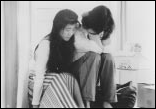|
|
 |
監督・構成:諏訪敦彦 Director : Suwa Nobuhiro |
|
なぜフィクション映画はドキュメンタリーとは呼ばれないのだろうか?世の中の多くの人が日常生活の中で演技をしているのなら、フィクションのなかの“演技の独自性”とどう違うのだろうか?諏訪敦彦監督は彼の処女作『2/デュオ』でこの疑問を投げかけている。彼はこれまでテレビのドキュメンタリー番組のディレクターや、長年にわたって長崎俊一や山本政志などの劇映画監督のアシスタント・ディレクターをしてきたが、この映画では綿密に描いてきたシナリオを最後の最後でなげだしてしまった。そして、出演者のふたりには映画のシチュエーションの概要だけ伝えて、後はすべて俳優たちに任せた。どういう風にストーリーが進展していくかも俳優たち次第となった。彼も、そして観ているわれわれも、優と圭の破局を迎えた恋愛関係の傍観者にすぎない。二人は言葉を発するけれども、その言葉は意味を成していかない。けれど彼らの無意味な会話は、現実の難しさをまざまざと浮き彫りにしている。出演者のふたりは映画のクレジットで“ダイアローグ”担当となっているが、脚本家のクレジットはでてこない。ふたりはそのシーンごとに自分の役柄を即興で演じ、感情表現が下手くそな現代の若者、本当の気持ちを体面のいい外面の中に隠してしまうような日本の若者を映画的に描き出している。 諏訪は作品の一部で出演者のふたりに演じさせつつ、離れたところからキャメラでその演技を追うという手法をつかっている。撮影は小川紳介作品のカメラマンの田村正毅だ。ロングショットのフレームの広さが足りなくて、再度フレームし直す間にカメラの動きが演技を捉え切れないという場面がいくつかあるが、そういう場面をみると撮影の前にほとんど打ち合わせがされていないという印象が強まる。離れたところからふたりの演技を見ながら、きっと諏訪は、ふたりの役作りに自分は介入していけないのだと感じたに違いない。だから、ふたりの登場人物の内面に迫る方法として、ドキュメンタリー独自の手法、つまりインタビューの手法をつかっている。このインタビューのシーンで『2/デュオ』はドキュメンタリー作品に限りなく近くなっている。ここで、この作品は映画の製作過程の記録映画となり、そして自分の存在が不確かな世代のドキュメンタリーとなっているのだ。 |
Why can't we call a fiction film a documentary? If most of us act in our everyday lives, what differ-ence does it make that it's " only acting " in fiction? Suwa Nobuhiro seems to pose these questions in his feature debut, 2 Duo. Both a documentary director for television and a veteran assistant director to such fiction filmmakers as Nagasaki Shun'ichi and Yamamoto Masashi, Suwa wrote a detailed script for the film only to throw it away at the last instant. He decided to give his actors a short outline of the situation and leave the rest - including how the story would develop - up to them. He--and thus we--are mere observers to the troubled love affair between Yu and Kei. The two talk, but never say anything. Yet their vacuous conversations have the bitter taste of reality to it. Given screen credit for the dialogue (there is no screenwriter listed for the film), the two young actors improvised their character's lines on the spot, creating a compelling cinematic depiction of a contemporary Japanese youth unable to express its own feelings, hiding its true emotions in a feel-good facade. Suwa leaves his characters alone in part by allowing Tamura Masaki, the cameraman for Ogawa Shinsuke, to just follow their actions from afar. The long shot framing is imperfect and the camera movement often misses actions before reframing the characters, but that just feeds the impression that little has been planned beforehand. Standing at a distance, perhaps Suwa felt unable to penetrate
his characters' masks. To gain access to their subjective thoughts,
he thus resorted to a technique common to documentary: the interview.
It is at these moments when 2 Duo comes closest to being a documentary: a record of both its own
making and of a generation unsure of its own reality. |